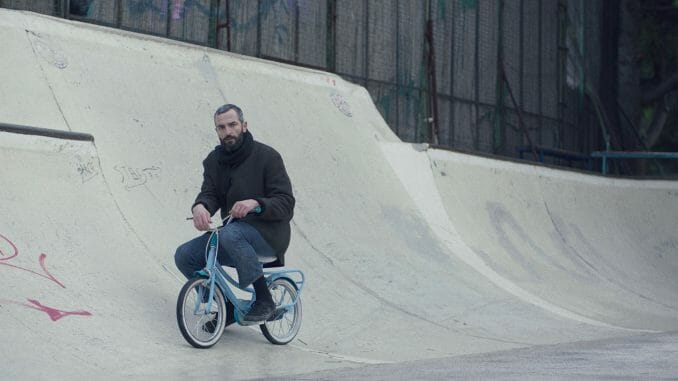Apples Is Ripe with Enticing Visuals and Muddled Metaphors

The intricacies of human memory and identity serve as the framework of Greek director Christos Nikou’s Apples. While the film is Nikou’s feature debut, the filmmaker cut his teeth as an assistant director on several noteworthy films over the years, from Yorgos Lanthimos’ Weird Wave staple Dogtooth to Richard Linklater’s trilogy culminator Before Midnight. Infusing the surreal with the romantic, Apples is certainly a product of Nikou’s career efforts, particularly when it comes to his sharp eye for capturing compelling visuals. However, Apples’ metaphorical backbone feels malnourished, its focus ever-inclined toward careful imagery as opposed to unraveling its inherent mythos. Nonetheless, Nikou’s debut offers interesting insight into the human psyche as it relates to memory and personhood while hinting at the fractured national identity of Greece itself.
In the midst of a pandemic that causes full-blown amnesia, several of the afflicted are labeled as “unidentified.” Found with no identifying documents on their person, they are shuffled off to hospitals where they’re tasked with rudimentary memory exercises. Aris (Aris Servetalis), a man who boards a bus one day only to wake up at the end of the line without any recollection of who he is or where he was going, is one of these. After spending some time at the hospital, he’s informed that no relatives have turned up to claim him, leaving Aris with one of two options. First, he can stay at the hospital indefinitely, waiting for loved ones who may never show up. His second option is enrolling in the New Identity program, which would help him craft an entirely new persona and reintegrate into society. He promptly chooses the latter.
Under the guidance of two paternalistic doctors played by Anna Kalaitzidou (also the corrupt sexual barterer Christina in Dogtooth) and Argyris Bakirtzis, Aris embarks on a series of increasingly complex tasks escalating in order to restore his social standing. He rides a bike, attends a costume party, receives a lapdance at a strip club and watches a horror movie at a local cinema. During the film screening, he notices a woman who’s so frightened she cowers behind the seat in front of her, barely able to hold her gaze to the screen. Afterward, he strikes up a conversation with her. Funnily enough, Anna (Sofia Georgovassili) is also part of the New Identity program, and their shared state of amnesia offers an immediate romantic connection. Yet as Aris’ tasks grow more complex, the severity of his memory loss becomes murky. Is his amnesia truly related to the recent pandemic, or is it a coping mechanism for a painful recent experience?
While Apples clearly addresses an existential human query—who are we without our memories and the personality they’ve helped shape?—it also probes at a nagging cultural anxiety over Greek national identity. In the wake of the country’s violent, state-sanctioned pushback of refugees to the Turkish border, a “loss of identity” takes on an immediate political connotation. Particularly when it comes to the New Identity program that outlines “essential” facets of the human experience, there is actually very little engagement with overtly Greek culture. The exercises Aris undergoes to rekindle and strengthen his memories all evoke distinct national identities, none of them Greek. He’s presented with Russian ballets, an American yuletide jingle, the image of a Mexican mariachi performer. At the mandated costume party, Aris dresses up as a NASA astronaut, while others don costumes resembling Batman, Catwoman and a collegiate cheerleader. Even the scary movie Aris and Anna are assigned to view is a riff on the unmistakably American The Texas Chain Saw Massacre.
-

-

-

-

-

-

-

-

-

-

-

-

-

-

-

-

-

-

-

-

-

-

-

-

-

-

-

-

-

-

-

-

-

-

-

-

-

-

-

-








































